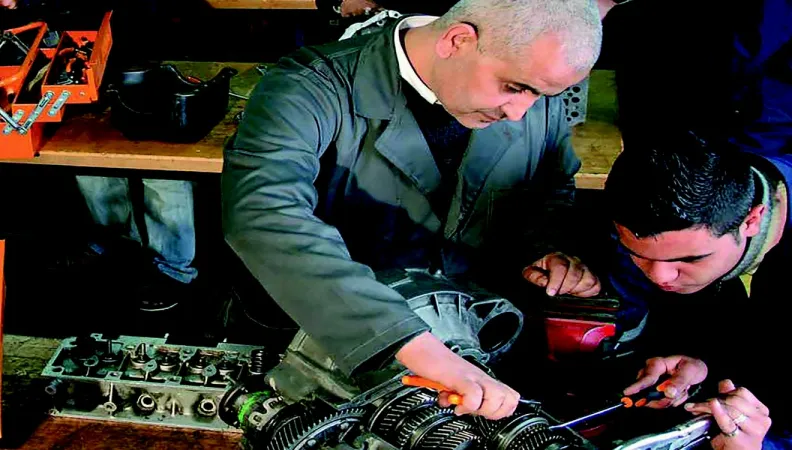Share the page
Young People Entering Morocco’s Industrial Ecosystem via Public-Private Partnerships
Published on

Morocco has been developing a professional training system to better serve the needs of its industrial sector. A recent evaluation of such AFD-backed programs laud their success in the recruitment of young people and in the programs’ contribution to the country's economic activity.
|
Evaluations Report 2023
Our work in photos and figures
Find out more
|
In the late 2000s, Morocco carried out several reforms to develop both its industrial sectors and the professions that will serve them as well as the global economy. The key to such advances? Vocational training.
The objectives were to expand training and professional integration opportunities for young people, develop business competitiveness in key sectors (e.g., the automotive, aeronautics, and renewable energy industries), and provide companies with skills that meet their needs. It’s against this backdrop that AFD supported several projects between 2008 and 2021 to set up the first eight delegated management institutes (DMIs).
Boosting the rate of professional integration
A project evaluation (link in French) conducted by the firm Baastel, noted the high rate of professional integration of DMI graduates. With between 80 and 100% of the trainees having found a job at the end of their training, the project results were better than the 65% average among conventional vocational training centers. This success is due to the significant participation of professional branches, whose companies are heavily involved in managing the DMIs, and orient and adjust the training according to market needs. In this way, competent specialists provide technical training directly inspired by field practices.
See also: Evaluations Report 2023
Toward a genuine industrial ecosystem in Morocco
More broadly, these institutes encourage economic growth, as they support skills development and job creation in strategic sectors. Nearly two thirds of employees in the aeronautics sector for instance have either completed their qualifications or are continuing to train at the Aeronautics Professions Institute (Institut des métiers de l'aéronautique – IMA), one of the eight DMIs supported. “The IMA is now considered a model and benchmark for vocational training,” says Patrick Ménager, its CEO. “It’s helping to create and develop an aeronautics industry in Morocco, where one hadn’t been expected to emerge.” Given the size and complexity of aeronautics, it feeds into other industries downstream, thus enriching the economy as a whole.
The DMIs are part of a public-private partnership: the government finances the DMI facilities then delegates their management to professional branches of the private sector. “This model helps strengthen business competitiveness, develop the skills of young people, and then integrate them into dynamic and promising economic sectors,” says Florent Sassatelli, head of the Social Sectors unit at the AFD field office in Morocco. With more and more people being trained – and with employers notably satisfied – such management and governance systems are bearing fruit. The self-financing of the IMA operating budget is also improving, having reached 60% in 2019 compared to 30% in 2015.
Financing and accountability: two projects for the future
However, increasing funding for the DMIs remains a challenge. They were supposed to achieve financial autonomy five years after their creation, but they still need to be subsidized. This is partly due to the high cost of an economic model that must provide free initial training and yet simultaneously develop qualifying continuing training and business services. Discussions are underway with public authorities to propose alternative financing solutions for the DMIs, such as funding from local authorities.
Another issue identified by the evaluation is the monitoring by public authorities of the DMIs to ensure compliance with commitments made in the management agreements. The development of a legal framework and target-based contracts between the DMIs and the government—which must make significant investments—would make it possible to strengthen the accountability of the institutes and at the same time guarantee their independence.
New DMIs on the way
In December 2022, AFD granted new funding to support the creation of two new DMIs: one on pharmaceutical industry professions and the other on water and sanitation professions. At the same time, the Office for Vocational Training and Job Promotion (which represents 85% of the public offer) is supporting a change in governance for some of its training centers, with the goal of greater private-sector involvement. This DMI model is recognized for its effectiveness and has inspired other AFD-funded vocational-training support projects, for example in Senegal and Djibouti.
